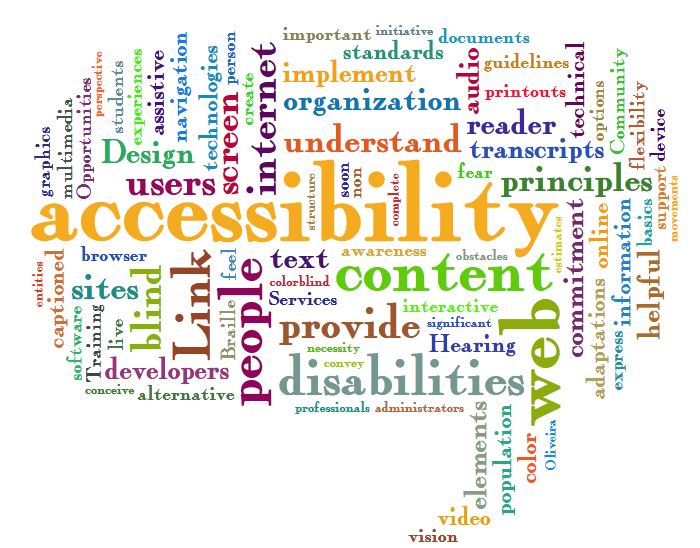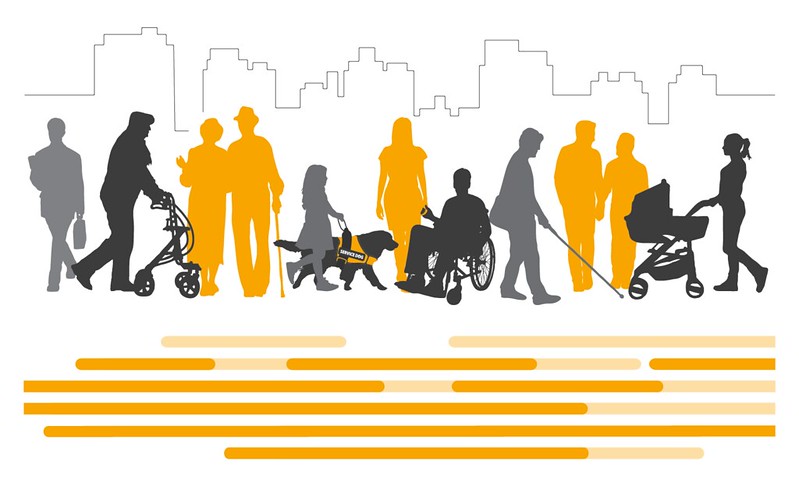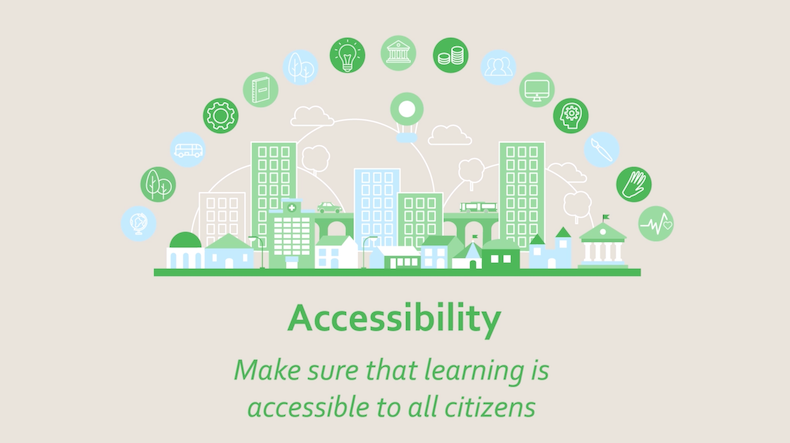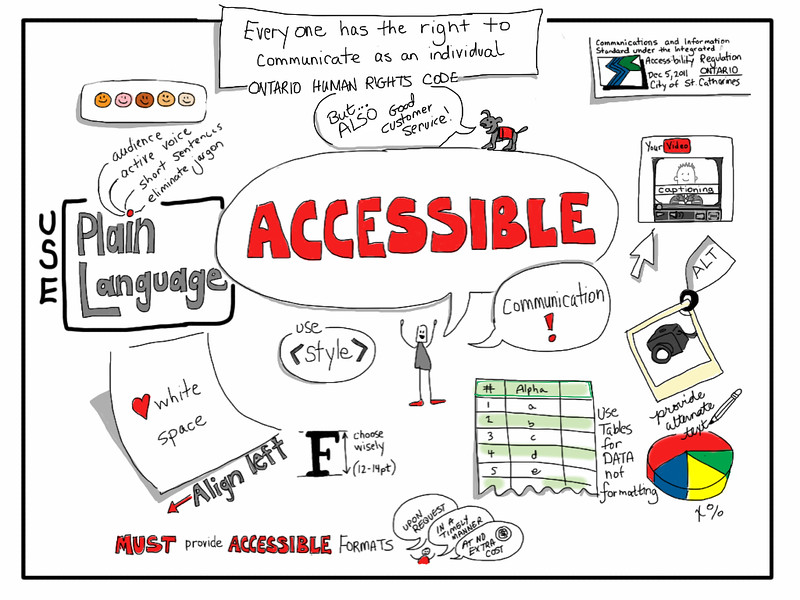As Educators, We Think We Are Inclusive…But Are We?
Accessibility and Inclusivity of Adult Online Learning
Funding Proposal for an Open Education Resource for Educators
Created by Lori Jones, Eva Somogyi, and Erica Hargreave (July 2020)
Project Overview
A Video Tour / Tease to What We Are Creating
About Us
This project has been developed by a team of educators, storytellers, educational technologists, and learners with disabilities.
Mission
To transform adult online learning by connecting, empowering, and inspiring educators and adult learners with disabilities to work collaboratively to improve the accessibility and inclusivity of online learning.
Vision
To create an enduring and living resource space where adult learners with disabilities can share their lived experiences with online learning and accessibility / inclusivity, and educators can learn from their experiences.
For change to happen and to recognize systemic ableism, educators need to see learners with disabilities as individuals, rather than numbers, and as equal partners in their education. Educators need a better understanding of learner diversity, and different solutions to learning needs, even within the same groups of disability. Through this living resource, we hope to help educators recognize this and the value in collaborating with their students with disabilities to create a more accessible online educational experience.
Meet the Team
Our team has the unique perspective, including that of educators, storytellers, educational technologists, and learners with disabilities, helping us to see the challenges and solutions from dual perspectives – both as the educator and as the learner with disabilities.
Lori Jones
Lori Jones is a disabled teacher in the K-12 public school system in British Columbia, Canada. She also works as a private contractor doing digital design work, and is currently a graduate student at the University of British Columbia in the Master of Educational Technology (MET) program.
Eva Somogyi
Eva Somogyi has 16 years teaching adult education, with 11 of those years teaching in BCIT’s Nursing Program. Currently she is working towards completing her Masters of Educational Technology at UBC.
Erica Hargreave
Erica Hargreave is an award winning educator and storyteller with disabilities, who has had an eclectic career, in which she has taught children as young as pre-schoolers to seniors in Elderhostel groups, and all stages of education in between. At present she develops and teaches online post-secondary courses for BCIT’s Broadcast Media and Communications Part Time Studies Program and develops and teaches online courses in contemporary media through StoryToGo. As a storyteller, she has created, written for, acted in and produced TV series, films, and web series; written for magazines and the web; founded digital magazines; and developed storyworlds and universes across platforms of media.
Project Start Date: October 1, 2020
Completion Date for Phase 1: March 31, 2021
Statement of Need
Who decides what makes online content accessible? Are we asking learners with disabilities what makes learning accessible to them, what is problematic, and what solutions work best?
Online education can be a wonderful medium to help make education accessible to all, provided there is inclusivity in the design of online learning experiences. Traditionally educators and technologists make decisions for learners about what they believe learners need to make online learning accessible. This often means that decisions on accessibility are being made from a systemically ableist perspective.
An Abled imaginary relies upon the existence of a hitherto unacknowledged imagined shared community of able-bodied/minded people held together by a common ableist homosocial world view that asserts the preferability and compulsoriness of the norms of ableism.
(Campbell, 2008)
Accessibility is a basic human right, and as such accessibility should be in place for all learners where possible, without the learner having to perpetually advocate for their needs.
The Convention on the Rights of Persons with Disabilities came into force on 3 May 2008. The Convention outlines the civil, cultural, political, social and economic rights of people with disabilities. Member States which have signed the Convention agree to promote, protect and ensure the full and equal enjoyment of the human rights and fundamental freedoms of people with disabilities and prompt respect for their inherent dignity. WHO welcomes this historic human rights treaty which provides a moral compass for action at national and international levels, and which underpins WHO’s disability work.
(Din Alwan, 2016)
Yet, when we look at adult education, we are often dealing with researchers or industry professionals who have limited to no educator training, let alone training in how to develop their courses with Universal Design in mind. And quite often the institutions that are offering adult education have systemic ableist views – that is to say they subscribe to the idea of norms. (Campbell, 2008)
For example, in taking a preliminary look at one post secondary institution, a request to the Disability Resources Center (DRC) for further information for educators was directed back to Human Resources (HR), stating that DRC is for students only. In looking at the institution’s HR site it showed a mostly medically ableist definition and categorization for instructor resources. There was no evidence that learners with disabilities had ever been consulted about their needs.
We also realized recently that in BC to apply for the Canada Student Grant for Students with Permanent Disabilities, students must apply through StudentAidBC, but StudentAidBC does not fund Part Time Studies Programs even if Part Time Studies is what makes education accessible to a student with permanent disabilities. In questioning this with the Minister of Advanced Education, Skills and Training, and the Minister of Education, we were sent a letter from StudentAidBC explaining the Ministry of Advanced Education, Skills and Training (AEST) is committed to making education accessible and affordable, telling us about all the wonderful things StudentAidBC is doing, and that none of those things including the Canada Student Grant for Students with Permanent Disabilities are accessible to students in BC in Part Time Studies Programs, as they don’t see Part Time Studies as worthy of their funding. This is a prime example of systemic ableist views in the education system that are placing some students with disability at a disadvantage, and where the decision makers are not listening to students with disabilities or in the case of our example here, their health care professionals.
When education ministries and funding bodies are creating inequities and demonstrating systemic ableism, that is bound to be an indicator of permeation throughout the system. If educators ask the accessibility centres in their institutions for help and are being denied assistance, then we are long overdue for resources that will promote positive change in helping educators make their online learning experiences more accessible and inclusive, building partnerships in accessibility between educators and learners with disabilities, and combating systemic ableism through collaboration.
To instil change, the thoughts and experiences of learners with disabilities need to be shared, and referred to when developing Universally Designed resources. Perceptions of disability and accessibility need to change, and educators and educational decision makers need to better understand and recognize ableism.
All too often as educators, we neglect to acknowledge that the learners themselves have first-hand knowledge of best practices for their online learning. If only we’d ask, listen, and act upon learner’s requests, we could improve delivery of online learning. Our project aims to provide a framework to begin this vital collaboration.
Reflecting on Our Journey with Ableism
References
World Health Organization https://www.who.int/disabilities/media/news/unconvention/en/
Campbell F.K. (2009). The project of ableism. In Contours of Ableism (pp. 1-15). London, U.K.: Palgrave Macmillan.
Project Description
This project aims to create a community of collaboration between educators and learners with disabilities. We aim to target and create accessible, online educational experiences and address systemic ableism in education for adult learners with disabilities. As a part of this project, a variety of educator-focused resources will be developed. We aim to create the opportunity for Universal Design that incorporates the thoughts and experiences of adult learners with disabilities with online learning. These will include:
- A vlogcast and podcast series sharing the thoughts of adult learners with disability around their accessibility issues with online education, solutions they have found to those accessibility issues, and their hopes and desires for the future of online education.
- A case study series, in the form of blog posts, developed from the vlogcast and podcast series.
- A series of open educational courses for educators, helping them to build accessibility for all via universal design into their online educational materials, starting with a course on ableism.
- An open educational course for learners with disabilities about advocating for themselves and their needs in online learning environments, and working with educators to meet those needs.
- A forum or community group for further dialogue between educators and learners with disabilities on accessibility and systemic ableism in education and online learning.
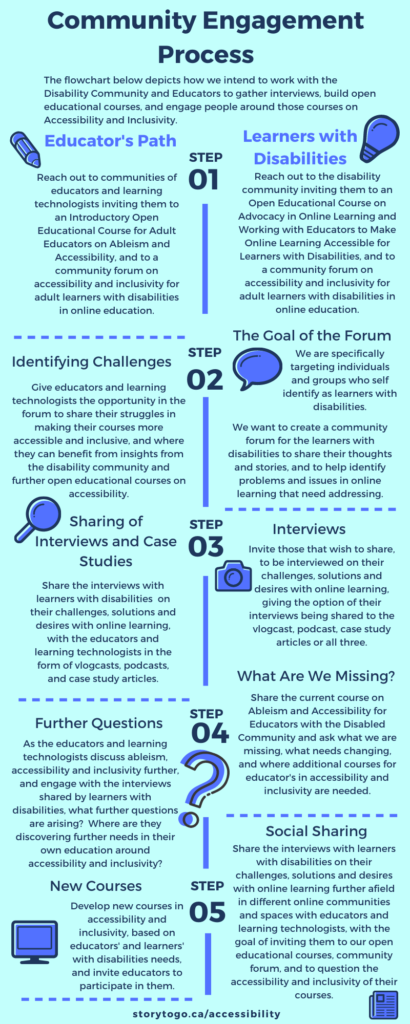
Goals & Objectives
- Provide a forum for adult learners with disabilities to share their thoughts and experiences on their accessibility issues with online education, solutions they have found to those accessibility issues, and their hopes and desires for the future of online education.
- Encourage and support educators in listening and learning from the thoughts and experiences of adult learners with disabilities, in endeavouring to make their online learning universally accessible.
- Create a connection and facilitate the conversation between adult learners with disabilities and educators.
- Encourage a meaningful dialogue in best practices in accessibility in online learning, led by the disabled community of adult learners.
- Develop ongoing and enduring resources and community that are shareable, free and / or open, and accessible.
- Create a positive representation of learners with disabilities around their needs in online learning.
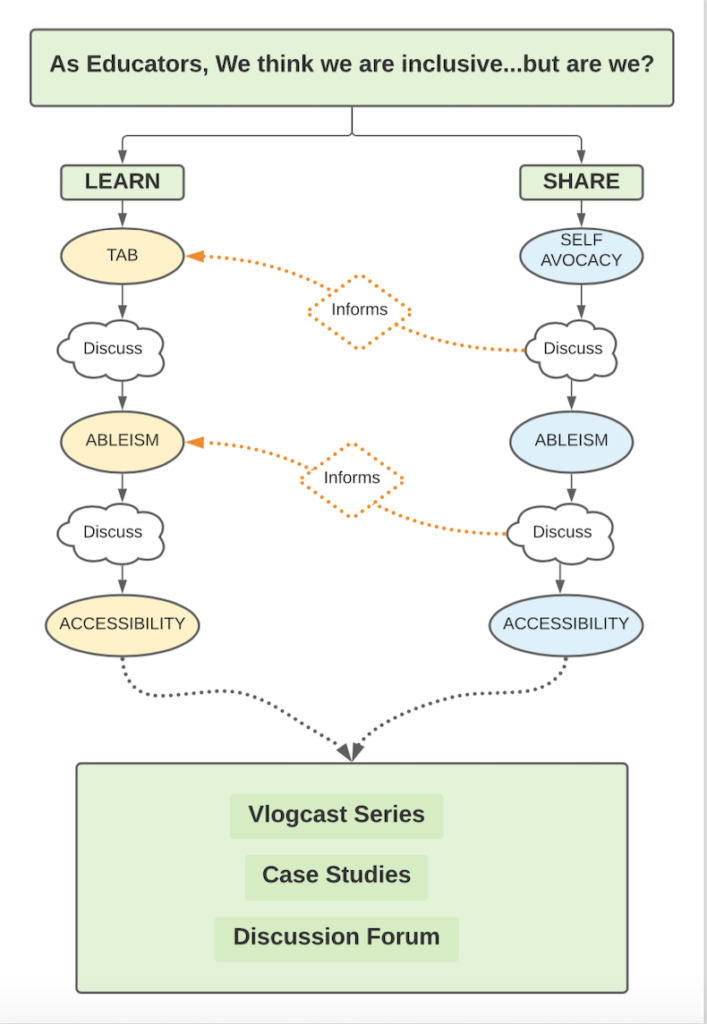
Timeline
| Activity / Milestone | Complete By |
| Develop an Introductory Course for Educators on Ableism. | October 31, 2020 |
| Create a forum and invite stakeholders for developing a course for learners with disabilities on advocating for themselves and their needs in online learning environments, and working with educators to meet those needs. | November 1, 2020 |
| Develop a Course on Advocacy in Online Learning and Working with Educators to Make Online Learning Accessible for Learners with Disabilities. | November 30, 2020 |
| Connect with, invite, and interview Adult Learners with Disabilities for the Vlogcast and Podcast Series. | December 31, 2020 for 1st Round of Interviews |
| Begin releasing webisodes of the Vlogcast and Podcast Series. | January 1, 2021 |
| Begin releasing the Case Studies. | February 1, 2021 |
| Create a forum and invite stakeholders for developing a series of courses on Universal Design, tailoring courses to address the needs of differently abled groups of learners. | February 2, 2021 |
| Develop a Course on Working with Learners with Disabilities to Make Online Learning Accessible for Educators. | March 1, 2021 |
| First in a series of courses on Universal Design, tailored to address the needs of differently abled groups of learners. | March 31, 2021 |
Budget
| Activity / Item | Price | Quantity | Total |
| Vlogcast and / or Podcast Webisode | 500 / webisode | 10 | 5,000 |
| Case Study | 200 / case study | 10 | 2,000 |
| Open Educational Course | 2,000 / course | 4 | 8,000 |
| TOTAL | 15,000 |
Appendix
Below are outlined a number of supporting documents that we are developing to accompany our various grant proposals. These are works in-progress that are being developed at https://storytogo.ca/accessibility-project/appendix/
- Cover Letters
- Foundation
- Academic Institution
- Research Ethics Board
- Sample REB Submission
- Consent Form
- Project Materials
- Video Interview Questions
- Sample Course Mock Up
- Sample Vlogcast Series
- Sample Case Study
- Letters of Support
- Research Support
